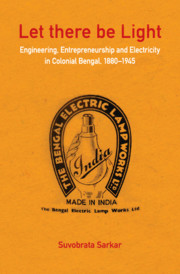Book contents
- Frontmatter
- Contents
- List of Figures
- Preface
- Acknowledgements
- List of Abbreviations
- Introduction
- 1 Technical Knowledge and Its Institutes
- 2 Entrepreneurship, Industry and Technology
- 3 Electrification: The Shaping of a Technology
- 4 Domesticating Electricity
- 5 Assimilation of Technological Ideas
- Conclusion
- Bibliography
- Index
2 - Entrepreneurship, Industry and Technology
Published online by Cambridge University Press: 30 April 2020
- Frontmatter
- Contents
- List of Figures
- Preface
- Acknowledgements
- List of Abbreviations
- Introduction
- 1 Technical Knowledge and Its Institutes
- 2 Entrepreneurship, Industry and Technology
- 3 Electrification: The Shaping of a Technology
- 4 Domesticating Electricity
- 5 Assimilation of Technological Ideas
- Conclusion
- Bibliography
- Index
Summary
Bengal is the poorer for the death, which took place yesterday at the age of only 52 of Mr. H. Bose, the well-known perfumer. Mr. Bose was a born businessman. He came from Eastern Bengal and studied both at University and Medical College at Calcutta. He did not graduate either in Arts on Medicine, but his Medical studies appear to have directed his attention to the subject of perfumes and here his business acumen enabled him to score a veritable triumph. But Mr. Bose's energies were too great to be confined to a single trade, and a few years ago he developed a large Gramophone Business, started a well-equipped printing press, and launched out into the motor trade. Most if not all these enterprises have been highly successful.…
—The Statesman commemorates the sudden demise of Hemendra Mohan Bose, popularly known as H. Bose, famous perfumer and mechanic (1916)An important subject to which I should like to refer is the progress of science and industry in this country. Faced as we are with international conflicts of gigantic proportions, it does not require much imagination to see that the scientific and industrial development of a country is essential not only for its prosperity but also for its very existence. The industrial development of a country is, however, conditioned not only by research but also by the all-important questions of finance and national policy. In Germany, the intimate cooperation among the government, universities and the industrial organizations resulted in a very rapid development.… If the government, universities and industrial organizations are made to participate in a national policy of intensive industrialization, none can resist the early attainment of India's economic freedom.
—Syama Prasad Mookerjee, eminent educationalist and politician, in his speech delivered at the Banaras Hindu University Convocation (1940)The collaboration between academic institutions, industry, and the state is vital to innovation and progress in a knowledge-based economy. Innovation, the reconfiguration of elements into a more productive combination, takes on a wider connotation in today's world.
- Type
- Chapter
- Information
- Let there be LightEngineering, Entrepreneurship and Electricity in Colonial Bengal, 1880–1945, pp. 78 - 114Publisher: Cambridge University PressPrint publication year: 2020



